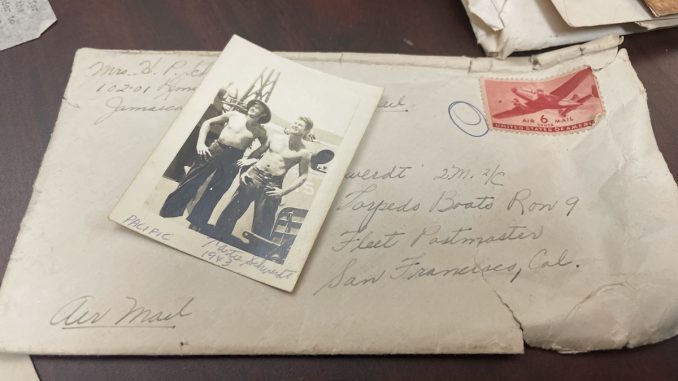
Love and grief are often inextricably tied together, but for Kaitlin Oster, they’re also powerful tools that have helped her both process immense loss and create something truly compelling.
A lifelong writer, Ms. Oster grew up in Southold and was very close to her grandparents, fellow Southold residents Harold and Loretta Schwerdt. Harold and Loretta met on the playground during the Great Depression and stayed together until her death in 2007. After Loretta’s passing, Ms. Oster was given a box full of letters her grandparents wrote to one another during Mr. Schwerdt’s time as a prisoner of war in World War II. Ms. Oster, as a way of processing her grief and out of sheer fascination — these letters told a remarkable story of love during wartime — transcribed and adapted the letters into a serialized story called “Letters to Loretta,” which was published over 35 weeks on Sandboxx News, a non-partisan military news publication.
But Ms. Oster didn’t receive the box and immediately work on telling her grandparents’ story. Instead, the letters sat dormant for years as Ms. Oster’s own life story unfolded. After graduating from Southold High School, she earned a degree in English from Bridgewater State University in 2012, then pursued her talents as a writer and got an MFA in screenwriting from the David Lynch School of Cinematic Arts in 2023. Throughout her studies, she lost her mother, Patricia, in 2011, and her grandfather in 2019. Her various personal losses spurred her to make a change, and she moved from Southold to Grand Rapids, Michigan, where she now teaches English and film studies as adjunct faculty at Davenport University and Grand Rapids Community College.
Ms. Oster also found that writing helped her channel her grief, and she revisited the box of letters her grandfather had given her. Opening that box of 120 letters proved to be transformative both creatively and personally, as Ms. Oster learned more about her grandparents and stayed connected to them via their remarkable wartime correspondence.
“I always joke that I only ever knew my grandpa as an old man,” Ms. Oster said, noting he was 71 when she was born. “He never talked about the war. He had night terrors into his 90s.”
The letters — Harold’s written on German prison camp parchment paper — told an incredible story of survival while he was held captive at the Stalag XVII-B prison.
“Being able to apply my research skills to my narrative writing skills, I feel like I did a good enough job of honoring the history as well as the fact that it’s a love story,” she said.

She also did research on the prison camp, which was the inspiration for the sitcom Hogan’s Heroes, and came to appreciate why her grandfather hated talking about the war.
“It was so overcrowded that there were two to three men to a bed,” she said. “The American camp was designed to house 1,200 people, and it was overcrowded. The Red Cross would deliver stuff but the Nazis would make sure it didn’t get there on … the latrine was dismantled. It wasn’t anywhere as depicted in Hogan’s Heroes, and I wanted to do the truth of that.”
But while the story explores the horrors of World War II, it also shows his love for Loretta. Harold shielded his horrific experience for Loretta, writing of better times in the prison camp, like the rare instances the prisoners were allowed recreation and played softball.
“He made sure that she knew he was okay, and he wrote letters that told her everything was okay, even though they weren’t,” she said.
After the war — Harold survived, while his brother, Arnie, was killed in action — the Schwerdts bought a summer bungalow in Southold in the early 1970s and stayed there. They became deeply involved with the community, with Harold serving as the commander of the Southold American Legion. They had a long life together, and Harold visited Loretta’s grave after she died to leave roses every Saturday.
On Feb. 1, Ms. Oster gave an author talk about “Letters to Loretta” at the Museum of the Mighty Eighth Air Force in Georgia. Ms. Oster previously did research on her grandfather’s time in the air force there. She hopes that in the future, the story can be expanded upon in a film. But what’s most important to her, she says, is that her grandparents’ love story lives on. It can be read in full at sandboxx.us.
“The human will is so incredible that you have somebody worth surviving for, someone you are desperate to come home to,” said Ms. Oster.
Harold was also an incredible poet, said Ms. Oster, reciting one of his letters:
“The noonday sun that melts the snow brings thoughts of you, and how easily my heart would melt if your grace could reach me.”

